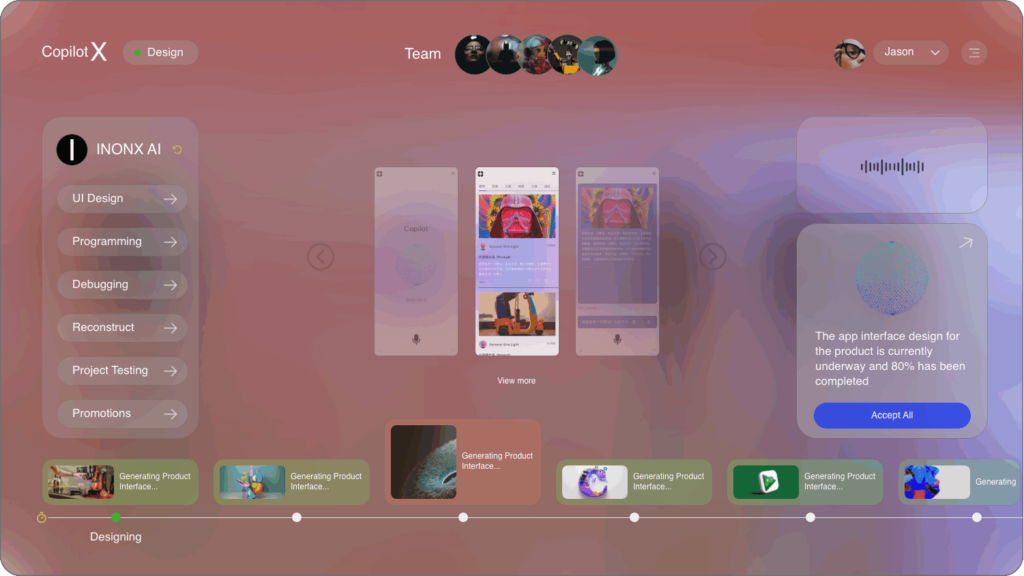Artificial Intelligence (AI) continues to accelerate at a remarkable pace, reshaping industries and redefining the boundaries of technological capabilities. As we step into 2024, several significant advancements and announcements in AI have emerged, highlighting newly released large models, advanced APIs, specialized technologies, and innovative products. This article delves into these recent developments and their potential implications across various sectors.
.
**Google’s Gemini 1.5 Pro: A Leap into Multimodal Capabilities**
One of the most talked-about releases in early 2024 is Google’s Gemini 1.5 Pro, an advanced Large Language Model (LLM) that promises to elevate AI multi-functionality. With enhanced multimodal capabilities, Gemini 1.5 Pro can process and generate text, images, and audio, enabling more intuitive interactions. Its architecture supports extended context understanding, allowing it to grasp complex inquiries and produce comprehensive outputs that span multiple forms of media.
Gemini 1.5 Pro is designed to tackle use cases in sectors like education, healthcare, and creative industries by providing innovative solutions. For instance, educators can utilize this model to create engaging multimedia learning experiences, while healthcare professionals can employ it to analyze medical data alongside imaging diagnostics. The potential applications appear limitless, making Gemini 1.5 Pro a key player in the rapidly evolving AI landscape (*Source: TechCrunch, 2024*).
.
**Advanced Tools and APIs: Key Integrators of AI Across Industries**
The integration of advanced AI tools and APIs across multiple sectors is set to transform business operations. Tools such as OpenAI’s API version improvements and Microsoft’s Azure AI platform have been at the forefront of these advancements. These updated APIs allow developers to embed AI capabilities right into their applications, enabling businesses to automate myriad tasks, reduce operational expenses, and enhance customer experiences.
As part of this wave, tools focused on visual content generation have gained traction. Services like DALL-E 3 and Midjourney have integrated with existing platforms, empowering businesses to create tailored marketing materials, product designs, and other visual assets with minimal effort. This ease of use democratizes access to sophisticated visual content creation, enabling smaller organizations to compete on a larger stage (*Source: The Verge, 2024*).
.
**Emerging Technologies: Specialized and Reliable LLMs**
While general-purpose LLMs have dominated the market, 2024 has ushered in a wave of emerging AI technologies that address more specialized use cases. Notably, the focus on developing more reliable and less biased LLMs is gaining traction. Companies like Anthropic and Cohere are pioneering efforts to create LLMs that are tuned to minimize disparities in outputs, ultimately enhancing trustworthiness and utility.
These advanced models are being designed specifically for high-stakes applications in sectors requiring the utmost accuracy and fairness, such as law, finance, and healthcare. By addressing biases and ensuring equitable performance across diverse demographics, these technologies can significantly impact decision-making processes and improve outcomes in critical areas (*Source: MIT Technology Review, 2024*).
.
**AI for Peacekeeping: Combatting Conflict with Data Intelligence**
An innovative application of AI technology is emerging in the field of conflict resolution and peacekeeping. Tools designed for autonomous intelligence, which utilize AI to analyze data from social media, news outlets, and sensor networks, are being developed to monitor potential conflict areas in real-time. These solutions aim to provide actionable intelligence and predictive analytics to peacekeeping forces worldwide.
Organizations, such as the Endangered Species Recovery Program and various United Nations initiatives, are beginning to experiment with these AI-driven platforms to analyze ground-level data for potential flashes of unrest. By enhancing situational awareness, these technologies could lead to more proactive measures being taken in conflict mediation, potentially saving lives and resources in volatile environments (*Source: Al Jazeera, 2024*).
.
**Innovative Products for Enterprise and Cybersecurity**
As AI’s importance grows, enterprise-grade products harnessing the latest AI advancements are proliferating. 2024 introduced solutions like IBM’s Watson X, which integrates advanced AI capabilities for enterprises seeking to automate workflows, enhance decision-making, and provide predictive insights. The ability to process large datasets quickly and efficiently means that businesses can identify trends and make informed decisions faster than ever.
In the realm of cybersecurity, AI-driven systems are playing a crucial role in identifying and mitigating threats. Companies like Darktrace are deploying autonomous cybersecurity systems that use machine learning to recognize anomalous behavior within networks. By continuously learning and adapting to new threats, these systems are transforming the approach to cybersecurity, allowing organizations to protect sensitive data while reducing incident response times (*Source: Wired, 2024*).
.
**Impact on Healthcare, Business Automation, and Education**
The advancements and innovations in AI are having a far-reaching impact across various domains. In healthcare, AI models that analyze patient data can provide personalized treatment recommendations, enhancing care quality while reducing administrative burdens on healthcare professionals. For example, the integration of AI tools within Electronic Health Record (EHR) systems helps predict patient deterioration, leading to improved outcomes (*Source: Healthcare IT News, 2024*).
Business automation remains a key area where AI’s capabilities are being leveraged. Automated customer service agents powered by advanced LLMs can manage inquiries 24/7, freeing human staff to focus on more complex issues. Such applications not only increase efficiency but also enhance the overall customer experience (*Source: Forbes, 2024*).
In education, as previously noted, models like Google Gemini 1.5 Pro enable interactive learning experiences tailored to diverse student needs. AI-driven educational technologies can adapt in real-time to student performance, personalizing the learning journey and making education more accessible (*Source: EdSurge, 2024*).
.
**Conclusion: Navigating the Future of AI**
The advancements and innovations within the AI landscape as of 2024 demonstrate a clear trajectory toward increasing sophistication and integration across various fields. From Google’s Gemini 1.5 Pro introducing multimodal capabilities to AI’s growing application in peacekeeping efforts, the potential applications are vast and groundbreaking.
As AI continues to evolve, its impact will deepen across healthcare, business, education, and beyond, reshaping how we operate and interact in an increasingly digital world. Technologists, businesses, and policymakers must stay informed and engaged as we navigate these changes, ensuring that AI technologies are harnessed ethically and responsibly to benefit society at large.
(*Source citations: TechCrunch, The Verge, MIT Technology Review, Al Jazeera, Wired, Healthcare IT News, Forbes, EdSurge*)


























